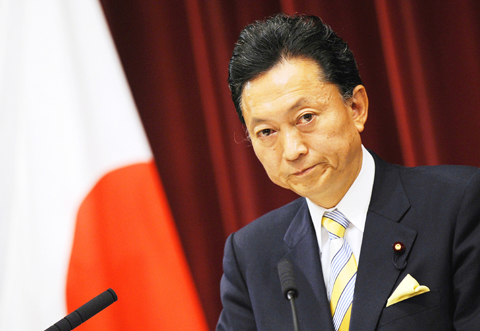Public support for Japan’s new prime minister has plunged to 48 percent from a high of 71 percent, with a growing number of voters complaining he lacks leadership amid a deadlock over the relocation of a US military base, a poll showed yesterday.
The poll by the major daily Asahi Shimbun found the latest approval rating for Yukio Hatoyama’s Cabinet dropped 14 percentage points from 62 percent last month and was down from 71 percent in September, when Hatoyama took office.
Around 74 percent of respondents in the Asahi survey said Hatoyama lacked leadership, with another 60 percent disapproving of his handling of the relocation of a US Marine base on the southern Japanese island of Okinawa.

PHOTO: EPA
The relocation of the US military base is at the center of a growing row between Tokyo and Washington. Under a 2006 plan, the US base was to be moved to a less crowded part of northern Okinawa, but Hatoyama has said the relocation site could be changed — perhaps even off the island.
The US had hoped for a resolution on the relocation issue by year’s end. But Japan recently postponed a decision for several more months, deepening a deadlock over the relocation issue.
The latest survey showed public support for Hatoyama fell below the crucial 50 percent mark just three months after he took office following a historic electoral victory in August.
When he took office in September, the premier enjoyed stellar public support amid surging public expectations. Hatoyama’s Democratic Party of Japan had ousted the long-ruling Liberal Democratic Party from power in historic elections in August.
The disapproval rating for Hatoyama rose to 34 percent this month from 21 percent a month earlier, the Asahi poll showed.
Another survey by the Mainichi newspaper found yesterday the approval rating for Hatoyama dropped to 55 percent this month from 64 percent a month earlier.
The disapproval rating for the prime minister increased to 34 percent from 21 percent in a previous survey a month ago.
Around 50 percent of respondents in the Mainichi survey said they do not support Hatoyama’s handling of the relocation of the US military base in Okinawa.
The Asahi conducted the survey on Saturday and Sunday through random telephone interviews. The paper said the survey had 2,115 responses. The Mainichi also conducted the poll over the weekend through random telephone interviews.

Swedish campaigner Greta Thunberg was deported from Israel yesterday, the Israeli Ministry of Foreign Affairs said, the day after the Israeli navy prevented her and a group of fellow pro-Palestinian activists from sailing to Gaza. Thunberg, 22, was put on a flight to France, the ministry said, adding that she would travel on to Sweden from there. Three other people who had been aboard the charity vessel also agreed to immediate repatriation. Eight other crew members are contesting their deportation order, Israeli rights group Adalah, which advised them, said in a statement. They are being held at a detention center ahead of a

A Chinese scientist was arrested while arriving in the US at Detroit airport, the second case in days involving the alleged smuggling of biological material, authorities said on Monday. The scientist is accused of shipping biological material months ago to staff at a laboratory at the University of Michigan. The FBI, in a court filing, described it as material related to certain worms and requires a government permit. “The guidelines for importing biological materials into the US for research purposes are stringent, but clear, and actions like this undermine the legitimate work of other visiting scholars,” said John Nowak, who leads field

Former Nicaraguan president Violeta Chamorro, who brought peace to Nicaragua after years of war and was the first woman elected president in the Americas, died on Saturday at the age of 95, her family said. Chamorro, who ruled the poor Central American country from 1990 to 1997, “died in peace, surrounded by the affection and love of her children,” said a statement issued by her four children. As president, Chamorro ended a civil war that had raged for much of the 1980s as US-backed rebels known as the “Contras” fought the leftist Sandinista government. That conflict made Nicaragua one of

NUCLEAR WARNING: Elites are carelessly fomenting fear and tensions between nuclear powers, perhaps because they have access to shelters, Tulsi Gabbard said After a trip to Hiroshima, US Director of National Intelligence Tulsi Gabbard on Tuesday warned that “warmongers” were pushing the world to the brink of nuclear war. Gabbard did not specify her concerns. Gabbard posted on social media a video of grisly footage from the world’s first nuclear attack and of her staring reflectively at the Hiroshima Peace Memorial. On Aug. 6, 1945, the US obliterated Hiroshima, killing 140,000 people in the explosion and by the end of the year from the uranium bomb’s effects. Three days later, a US plane dropped a plutonium bomb on Nagasaki, leaving abut 74,000 people dead by the